Retired police officers will be forced to give evidence to an inquiry into the Battle of Orgreave – which will begin later this year despite claims it is a ‘waste’ of taxpayer money.
Home Secretary Yvette Cooper has said the statutory public inquiry will investigate the events surrounding the clashes between police and miners at the Orgreave Coking Plant in South Yorkshire on June 18, 1984.
The incident saw miners converge on the plant to try to disrupt deliveries before they were met with force by thousands of police officers. More than a hundred people were injured during the most violent day of the 1984-1985 miners’ strike.
Campaigners have long called for an inquiry to investigate claims of police brutality and the blaming of miners’ for the violence as part of an alleged ‘institutional frame-up’.
In total, 95 picketers were arrested and initially charged with riot and violent disorder, but all charges were later dropped after evidence was discredited.
But demands for an inquiry had long been resisted by politicians including the late Lord Tebbit, who called it a ‘sheer waste of money’ and pointed out that many of the people involved were dead.
Today, the Taxpayers’ Alliance told MailOnline it was concerned about the cost of holding such the inquiry, considering how expensive and long they tend to be.
The inquiry will be statutory with powers to compel people to provide information where necessary, the Home Office said.
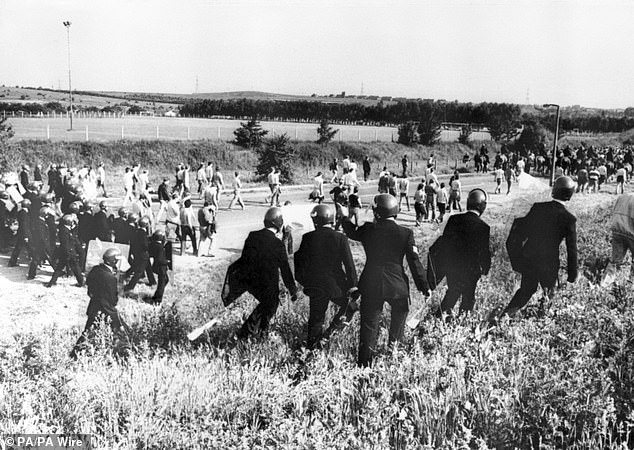
The statutory inquiry will investigate the events surrounding the clashes between police and miners at the Orgreave Coking Plant in South Yorkshire on June 18, 1984
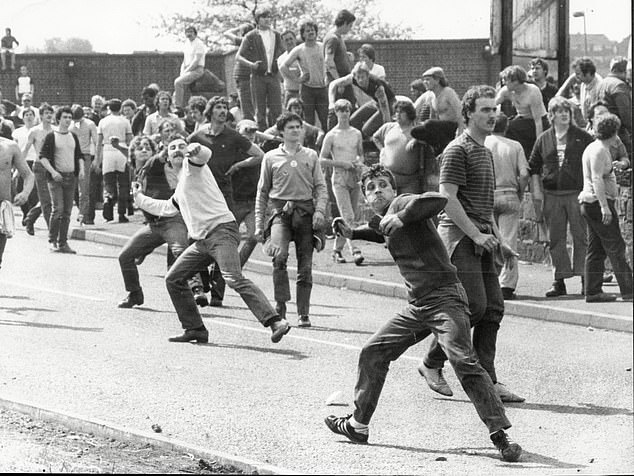
The incident saw miners converge on the plant to try to disrupt deliveries before they were met with force by thousands of police officer
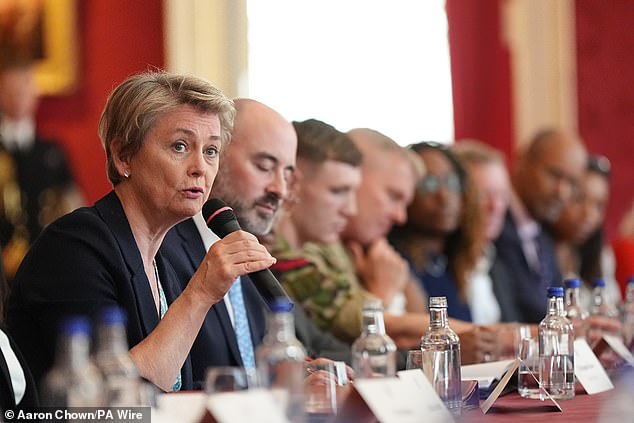
The inquiry – which was part of Labour’s manifesto – was announced by Home Secretary Yvette Cooper
The Rt Revd Dr Pete Wilcox, the Bishop of Sheffield, has agreed to chair the inquiry, which the Home Office said is intended to ‘aid the public’s understanding of how the events on the day, and immediately after, came to pass’.
Ms Cooper said what happened at Orgreave ‘cast a shadow over communities in Yorkshire and other mining areas’.
She added: ‘The violent scenes and subsequent prosecutions raised concerns that have been left unanswered for decades, and we must now establish what happened.
‘I pay tribute to the campaigners who never stopped in their search for truth and justice, and I look forward to continuing to work with them as we build an inquiry that gets the answers they and their communities deserve.’
The Home Office said formal consultation between the Home Secretary and the Rt Revd Wilcox on the inquiry’s terms of reference has begun.
The Rt Revd Wilcox said he did not ‘underestimate the weight of expectation or the significance of the task’.
He added: ‘I look forward to engaging with stakeholders in the coming weeks over the draft terms of reference, and to working with the government to identify experts to support me on the independent panel.
‘I expect the panel to begin its work in the autumn, and we will endeavour to deliver an inquiry which is thorough and fair, and which will uncover what happened at Orgreave as swiftly as possible.’
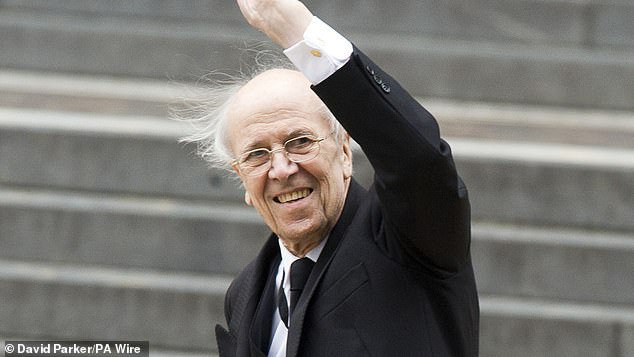
Demands for an inquiry had long been resisted by politicians including the late Lord Tebbit, who called it a ‘sheer waste of money’ and pointed out that many of the people involved were dead
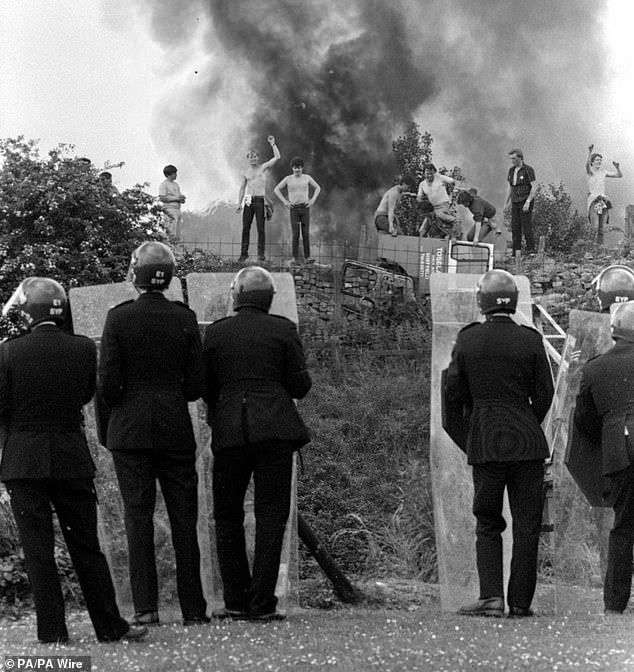
Police with riot shields face picketers during the confrontation on June 18, 1984
The Orgreave Truth & Justice Campaign (OTJC) said it wanted to know who was responsible for ‘organising and ordering the deployment of multiple police forces, including mounted police armed with truncheons, shields and dogs, against striking miners’.
The campaign group said it wanted the inquiry to find out how it was decided that ‘striking miners should be attacked and arrested at Orgreave and charged with riot and unlawful assembly, which carried heavy prison sentences’.
It added that it wanted to know why ‘the police operational order for police deployments that day disappeared and other evidence been destroyed or Embargoed until 2066 and 2071’.
OTJC secretary, Kate Flannery, said the announcement of an inquiry was ‘really positive news’.
Ms Flannery added: ‘We now need to be satisfied that the inquiry is given the necessary powers to fully investigate all the aspects of the orchestrated policing at Orgreave, and have unrestricted access to all relevant information including government, police and media documents, photos and films.’
The National Union of Mineworkers (NUM) general secretary, Chris Kitchen, said the inquiry was ‘hugely welcome’.
Mr Kitchen added: ‘The events at Orgreave, and throughout the strike, destroyed the trust between the police and mining communities even now, 41 years later.
‘It is vital that this trust is won back and the NUM believe this inquiry will go some way to rebuilding that trust.’
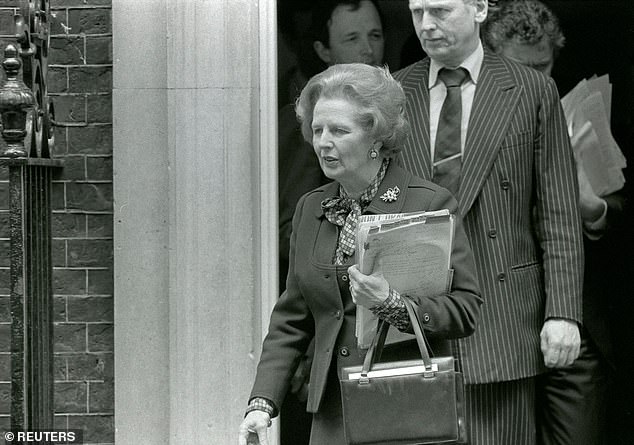
The Battle of Orgreave took place at the height of a year-long industrial dispute with Margaret Thatcher’s government
Kevin Horne, a miner arrested at Orgreave, said: ‘It is now over 41 years since a paramilitary style police operation was planned at Orgreave and it is important to remember that some of the miners attacked and arrested there are now dead and many others are old and ill.
‘We need a quick and thorough inquiry with a tight timescale so that surviving miners can at last obtain the truth and justice they have been waiting for.’
Mayor of South Yorkshire, Oliver Coppard, said the inquiry was a ‘landmark moment for justice and accountability’.
Mr Coppard added: ‘The Inquiry represents an opportunity to examine not only the actions of South Yorkshire Police and other forces on that day, but also the broader role of government at the time.
‘It’s a step towards setting the historical record straight, ensuring lessons are learned, and restoring public trust.’












